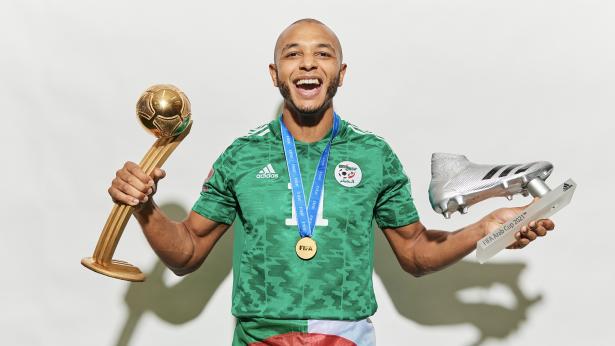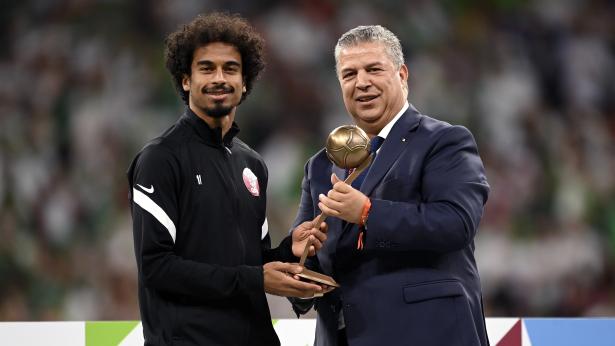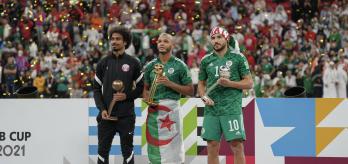Yacine Brahimi – Gold Ball Winner

Algeria's Yacine Brahimi, arguably the most high-profile player in the tournament, lit up the FIFA Arab Cup Qatar 2021TM and was subsequently crowned the adidas Golden Ball winner. The player of the tournament award was determined by FIFA's Technical Study Group (TSG), a team of experts comprised of Steve McLaren, Michel Sablon, Pascal Zuberbühler, Jürgen Klinsmann, Dwight Yorke and Chris Loxston.
Reliability and work ethic
The former African Footballer of the Year, African Cup of Nations winner and Portuguese domestic league champion was ever present for Algeria, starting every match and playing 98% of available minutes. The Foxes ultimately won the tournament, beating neighbours Tunisia in the final, a close contest wrapped up by Brahimi's 120th-minute tap-in.
Hard working and tenacious, Brahimi ranked extremely highly for both distance run and number of sprints as well as in applying defensive pressure, frequently preventing opponents from playing out from the back.
Clinical, creative and an offerer
Brahimi, who plays his club football in Qatar with Al-Rayyan, found the back of the net three times in the tournament from a relatively low two attempts on goal per match. However, almost half of his goal attempts were on target; this is linked to the midfielder's ability to make attempts in space, with only approximately 10% of his efforts being under direct physical contact from the opposition.
He constantly looked to create passing options for his team-mates on the left channel, pre-dominantly looking to get in behind the last man, with around 20% of his average of 50 offers per match in behind the opposition's final unit. He was able to get into good positions and find those pockets of space, receiving the ball one in three times he offered whilst rarely coming under direct pressure. However, due to his positive play, he often lost the ball in the final third.
When Algeria's number 11 succeeded in getting a pass away, one in three of these passes would break through the opposition's lines; he penetrated the opposition's final unit with his passes approximately two times per match. Despite almost three in four of his distributions being under pressure, Brahimi still managed a pass-completion rate of around 75% in total.
The TSG heavily praised his impact on games. Whilst not topping the tournament rankings in any one area, the Foxes' forward was above average in almost every metric: a clear indication of his match involvement.
Youcef Belaïli – Silver Ball Winner

Mohammed Youcef Belaïli, Algeria's number 10, was voted as the FIFA Arab Cup Qatar 2021 adidas Silver Ball winner by the TSG after an influential tournament where he directly contributed to three of Algeria's goals and pulled the strings in the Foxes' tournament-winning forward line.
After sitting out the opening match – a 4-0 win over Sudan – Belaïli was an ever present for Algeria and followed up his impressive performances by starting all three games in Algeria's ultimately unsuccessful bid to retain their African Cup of Nations title. His recent prominence earnt him a January deadline-day move to French Ligue 1 side, Stade Brestois 29.
Belaïli is hard working and covers much of the pitch, ranking him higher than average for distance run per match, number of sprints per match and top speed.
Threat and audacity
An attacker who offers a consistent threat in front of goal, he made 2.5 attempts on goal per match, with almost one in three on target. Of these attempts, he converted two – including a sensational strike from over 35 yards against close rivals Morocco at the quarter-final stage. Adept at finding space, none of his 16 attempts on goal came under direct physical contact from opponents.
Given the freedom to roam, the 29-year-old was a constant nuisance, often seeking out positions in the half spaces to create passing options for his team-mates. He made over 50 offers to receive per match, with around 20 of those coming in behind the last man as he looked to make that killer ball. As with his attempts on goal, he is adept at receiving the ball in space, frequently under close supervision by his opponents but rarely having to physically contest for the ball.
Looking for that end product, Belaïli does not generate a large volume of successful passes (18 completed distributions per match). But when he does, he often breaks the opponent's lines, with just under half of all his distributions breaking through. Almost one in three of his line-breaking distributions breaches the opponent's final unit, as can be seen by the locations of his line-breaking passes, which are primarily in and around the opponent's penalty area. However, he often struggled to beat his man one-on-one, completing only 30% of his take-ons.
Akram Afif – Bronze Ball Winner

Akram Afif, the host's standout player in the tournament, was voted as the FIFA Arab Cup Qatar 2021 adidas Bronze Ball winner by the TSG. He contributed to six goals as Qatar narrowly missed a place in the final, losing out to eventual winners Algeria in the second half of injury time at the semi-final stage.
Afif, who plays his club football with Qatari side Al-Sadd, started five of Qatar's six games in the tournament. Against Iraq, the one match where the left-sided attacker was absent from the starting line-up, he still managed a goal and an assist in an inspiring ten-minute cameo.
A playmaker with an eye for goal
More adept at creating chances (Afif assisted four goals in the tournament, unsurprisingly ranking first in this category), he nevertheless executed 1.2 attempts at goal per 90 minutes, with more than half either hitting the back of the net or forcing the goalkeeper into action. Similar to Brahimi and Belaïli, Afif was able to steer all of his attempts on goal without facing direct physical contact from opposition defenders.
Passer and receiver
Again, like Belaïli, Afif was a constant menace on the left-hand side, creating approximately 50 passing options for his team-mates per match, with almost one in three of those coming in behind the opponent's defensive line as he looked to stretch the play and create shooting opportunities for his team.
Afif was a frequent outlet for his team, receiving the ball from over 40% of his offering movements, though this tended to be in the deeper positions from where he could retain possession and look to build the attack. Around one in three of his distributions would break the opposition's lines, with almost 20% of these passes breaking the other team's defensive line - a percentage considerably higher than average. The majority of his line breaks were in and around the opposition's penalty area, from which he clocked up his four assists.
Calm in possession, he completed around 75% of his distributions, though he was able to execute the vast majority of his distribution without enduring physical contact with his opponents.





















